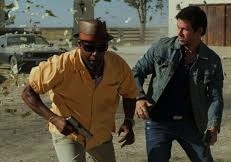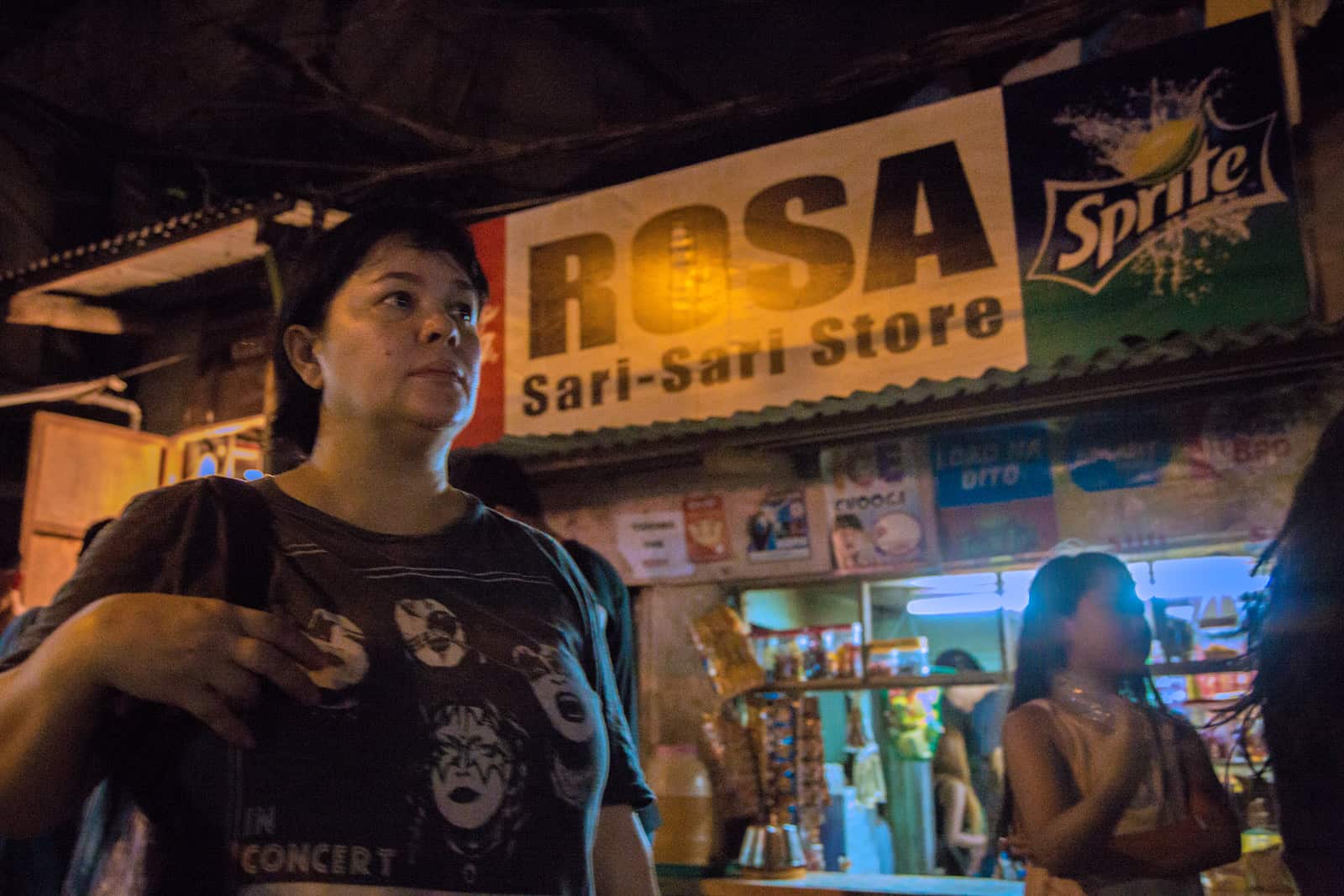 A Touch of Sin
A Touch of Sin
Written and directed by Jia Zhangke
China, 2013
Jia Zhangke’s opening scene for A Touch of Sin acts as a device for reintroduction. We have previously seen the sixth generation Chinese auteur craft with slow-paced sensibility and political tinge to win over audiences with Unknown Pleasures (2002), The World (2004), and Still Life (2006). The aesthete continues to creep alongside Jia’s work as his camera quietly pursues a man on a motorcycle, donning a Chicago Bulls skullcap and weighty cargo jacket, manufactured black but padded with a layer of dust. His journey is halted by three axe-wielding thugs demanding that he pay them before continuing. In another work by Jia, the man would have obliged in a symbolic gesture referencing the petty thievery involved in China’s newfound capitalistic empire. The symbolic gestures remain, but this man won’t easily oblige. Instead, he instinctively draws his pistol and fires, killing two but missing the third. He scares off the remaining bandit, his deed now read as self-defense, until he decidedly takes chase and hunts him down as if any mere threat is punishable by death: in Jia’s travelogue of mainland China, it might be.
We’re reintroduced to the Jia of Xiao Wu (1997), the man who may evince Robert Bresson in genre fair. For A Touch of Sin we see flickers of John Woo precision and King Hu’s wuxia camera. The English title is a play on Hu’s classic martial arts milestone, A Touch of Zen (1969), but translational puns need not be the sole hint of this influence. It’s invested in every chapter of the four-part excursion into the violent reactions against the evolving post-Mao China. In the opening episode, it’s found in the indiscriminate shotgun of Hu Dahai (Jiang Wu), who finds himself in a one-man-army against the corrupt coal mine boss Jiao and his associates. Mr. Chicago Bulls, Zhou San (Wang Baoqiang), takes the focus for the second installment as he returns to his wife and son, only to announce his interest in moving to Burma to shoot more guns. His fate is the most Bressonian, only far more anarchic as he acts as a pickpocket-qua-hitman upon rich victims. The full wuxia chapter belongs to Xiaoyu (Zhao Tao) who works as a sauna receptionist, only to have to fend off rich guests who mistake it for a full-on brothel with her as a prized commodity. Finally, the last chapter returns to Bresson, as Xiaohui (Luo Lanshan) directs his violence inward, overcome by the draining life of a factory worker and disillusioned by his fleeting romance. The stories weave into one another as Jia’s crew travels southward in order to capture the various political milieux present in modern day China.

The scope of this project is expansive, covering not only the various regions of China’s distressed people, but naturally including their various dialects. Jia asked the actors to perfect these dialects in preparation for their roles as he was admittedly tired of the mainland being framed as a nation where all peoples spoke in Mandarin. “This makes me very uncomfortable,” he remarked to Darren Hughes. “It’s unsettling.” Verisimilitude is also found within the narratives themselves, or at least the spirit of them. Each story is stripped from uncensored news articles as the various defeats of China’s evolutionary struggle for a new identity. Even the whispered or indirect stories, of a woman prostituting herself to live, only to contract HIV, or an administrative fault causing a high-speed train collision, gain significance from being imbued with some semblance of truth. It’s the pseudo-documentary storytelling that makes A Touch of Sin feel like a familiar Jia work, even when it’s periodically bathed in blood.
Of course, the fluids flow slowly. Rarely do we see the consequences of the killers’ actions, but the camera will focus on a body after death. Dahai, of the first chapter, asks a receptionist for the location of the village chief in order to exact his revenge for the selling of the communal mine. The receptionist is lighthearted but insensitive as he prods Dahai, calling him by his newly bestowed foreign name of “Mr. Golf”. To make a mistake like this is to be unaware of Dahai’s small shower of red fluid sprinkling the side of his face — he pays for this ignorance by meeting the end of Dahai’s tiger-powered boomstick. Though perhaps a bit annoying, the receptionist (we may assume) had very little to do with the ongoing political corruption, yet his fate is no different than those who orchestrated the miners’ mire. The camera follows his life being drained from the holes in his chest to the reservoir of blood seeping out from his shirt sleeve. In contrast, when finally meeting Jiao, a small explosion of blood and a quick smile from Dahai serve as the only meditation of his loss. For a revenge story, there is little sense of Tarantino-like gratification from each killing. Instead, each death is methodical and necessary — until they aren’t. Jia’s camera is aware of this distinction, meditating on the innocent yet taking distanced pleasure in the guilty, which is what ultimately frames the film as humanistic instead of bloodthirsty.

Yet, as much as the film purports to be a film about capitalism, the Chinese landscape or revenge-laden genre flicks, it’s ultimately an opera thoroughly embedded with the mystical elements of Chinese history. Or, rather, it utilizes these elements to work for modern metaphor and political appropriation. Dahai’s shotgun is wrapped in a tiger blanket and seems powered by the creature’s energy. Xiaoyu has a moment of clarity in a van filled with mystical snakes. Zhou San travels behind a trailer of cows who ultimately reappear as freed but obstructive beasts. The most powerful image comes from a man who whips his horse until it bucks over in pain. With Dahai’s later execution of the zoosadist, it may acknowledge us to read this scene as an encapsulation of the new abuses from China’s economic structure as a pitiful master-slave struggle. Yet the animal metaphors don’t end there — Xiaoyu relates to the sauna workers that she’s heard of animals being able to commit suicide, a tongue-in-cheek fact foreshadowing another chapter. That the highlighted animals are all a part of the Chinese zodiac, that one of the chapters revolves around the Chinese New Year, and that the first chapter and coda involve a traditional Chinese opera all serve as reference to the mythic land of China’s past, allowing Jia to explore these fragments of time while he tours the terrain. In the final chapter, Xiaohui’s love interest reveals that she’s a Buddhist who believes in doing a good deed each day to live well in the next life. Jia is aware of the lives that China has undergone, his violent tales being the cinema of karmic retribution.
Kino’s release of A Touch of Sin on blu-ray brings collaborating cinematographer Yu Likwai’s obvious talent – in capturing the dilapidated Chinese landscape – to the small screen in a well-deserved, high-quality transfer. The film’s use of sound as an aural landscape, gaining power from the omnipresent opera and quick bursts of accentuated violence, is equally aided by the release’s attention to digital surround sound. Sadly, the only extras are Kino’s promotional materials for their other releases. While the structure of the film itself is unbalanced thanks to the varying pacing of its chapters, A Touch of Sin still reveals a smart, blunt work of political discontent by a director adept at speaking through his images. The fourth chapter examines a district that manufactures iPhones, which you may be using to read this article. In that sense, the blame is universal. Jia pegs us all as the receptionist.
–Zach Lewis





